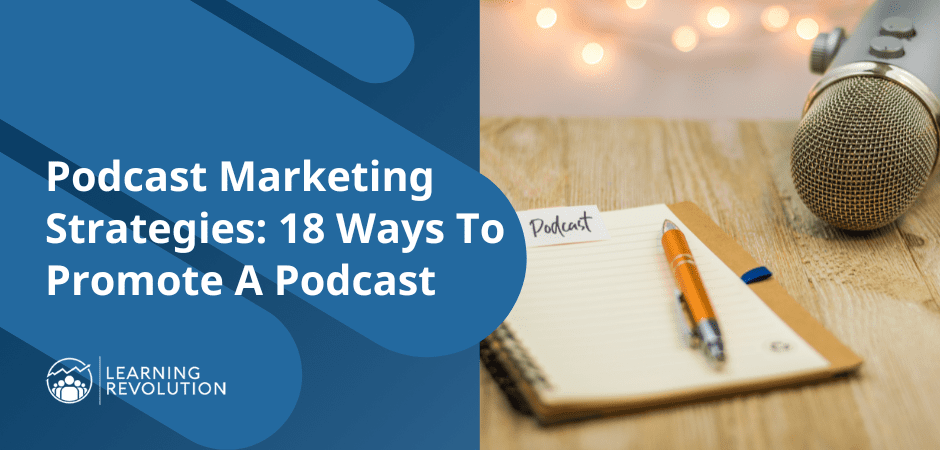

Did you know that a recent statistic from Buzzsprout shows that 26% of Americans listen to podcasts at least once a week? With over 100 million podcast listeners in the US and nearly 470 million globally, podcasts are among the most popular digital content formats.
So, starting a podcast is an excellent way to increase brand awareness, establish authority in your niche, and drive leads and customers for your online courses.
But to attract listeners to your podcast and stand out among thousands of competitors, you must follow a well-defined podcast marketing strategy.
That’s precisely what this article is about.
In the following sections, we’ve highlighted several proven podcast marketing techniques to attract relevant traffic to your podcasts and grow your audience.
Let’s dive in.
The Pre-Requisites Of Effective Podcast Marketing
Before diving into specific ways to promote a podcast and marketing strategies, it’s crucial to understand what makes a podcast marketable.
Understanding Audience Needs
Even the best podcast marketing strategies won’t help you build an audience if your content doesn’t address the right topics. So, you must research your audience’s burning questions, understand their most critical goals, and create content that takes them closer to success.
Creating Well-Researched High-Quality Content
Treat every podcast episode as a standalone resource for your audience packed with value and actionable content. To achieve this, you must thoroughly research your topic and discuss things your competitors haven’t covered. This is critical because going into an episode unprepared can backfire by damaging your reputation and turning your listeners away.
Choosing The Right Podcast Hosting Platform
Your podcast hosting platform greatly impacts your show’s reach and shareability. The right podcast hosting platforms offer sufficient space, advanced audience engagement, and content-sharing features, allowing your listeners to create a stronger bond with your show. To help you make the right choice, we’ve reviewed the best podcast hosting platforms here.
The Best Podcast Marketing Strategies To Grow Your Audience
Let’s now dive into some of the best podcast marketing strategies to attract relevant listeners and grow your audience. We’ll also include relevant podcast marketing examples with each strategy to show you how successful podcasters operate.
Podcast Marketing Tip #1: Create A Dedicated Podcast Website
If you want to turn your podcast into a brand and grow a loyal audience around it, you must start a dedicated podcast website that hosts your content and acts as a hub for all your marketing activities.
You’ll use your website to describe your podcast, create awareness about your content, and build an email list so that you don’t have to rely on the platform you don’t own to drive traffic.
Amy Porterfield, a well-known consultant and online course seller, has a dedicated podcast section on her website with her latest content and details of her podcast’s central theme.
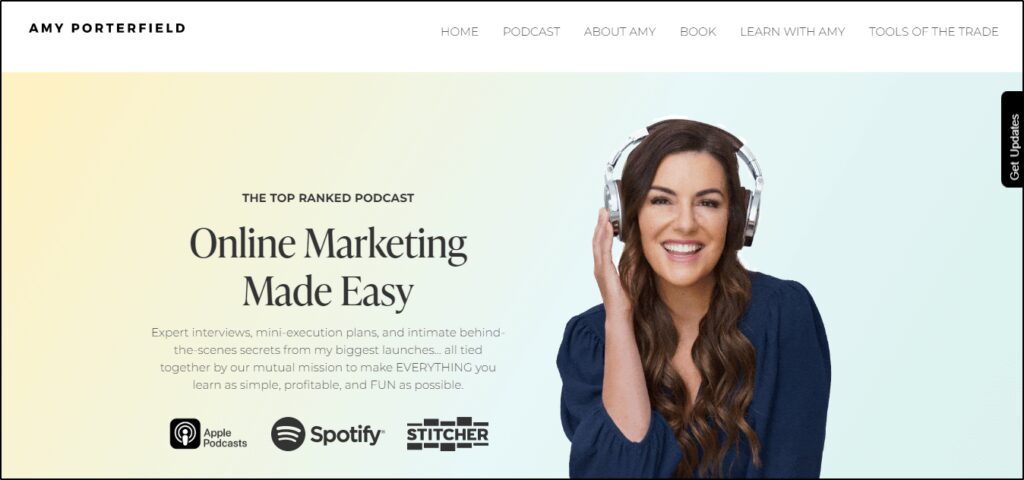

Pat Flynn, another familiar name in the eLearning and internet marketing industry, also has a podcast page on his website listing his latest episodes and guest profiles.
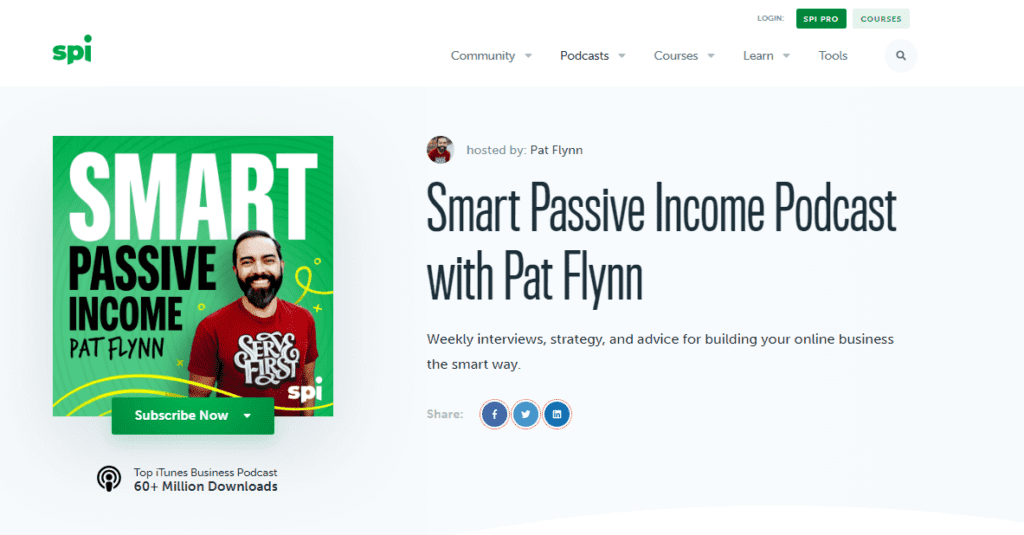

Here are some of the main marketing benefits of starting a podcast website.
- Your website is your own space where you have total control over how you position and describe your podcast.
- It is the home base where you will drive traffic using social media, email marketing, SEO, referrals, and other marketing techniques.
- You won’t have to rely entirely on Apple Podcasts, Spotify, or any other platform for listeners.
Consider this the first step of your podcast marketing strategy because most of the other techniques we’ll share in this article depend on your podcast website.
Podcast Marketing Tip #2: Kick Off With At Least 3 Episodes
When you start a new show, kick off by publishing at least three episodes together.
Why? Research shows that 46% of people binge-listen to podcasts. So, if they like your show’s first episode, they’d immediately want more content.
In addition, publishing three to five episodes together would also give you time to create new content ensuring you’re always ahead of your publishing schedule.
Podcast Marketing Tip #3: Submit To Podcast Aggregators And Directories
Podcast aggregators and directories are platforms that enlist thousands of podcasts in different categories and attract millions of listeners from across the globe.
For example, Apple Podcasts attracts 28.5 million monthly listeners from the US alone.
But dozens of other podcast platforms like Spotify, Google Podcasts, Audible, and Pandora collectively get millions of monthly users.
Here’s a list of the top podcast platforms where you can list your show.
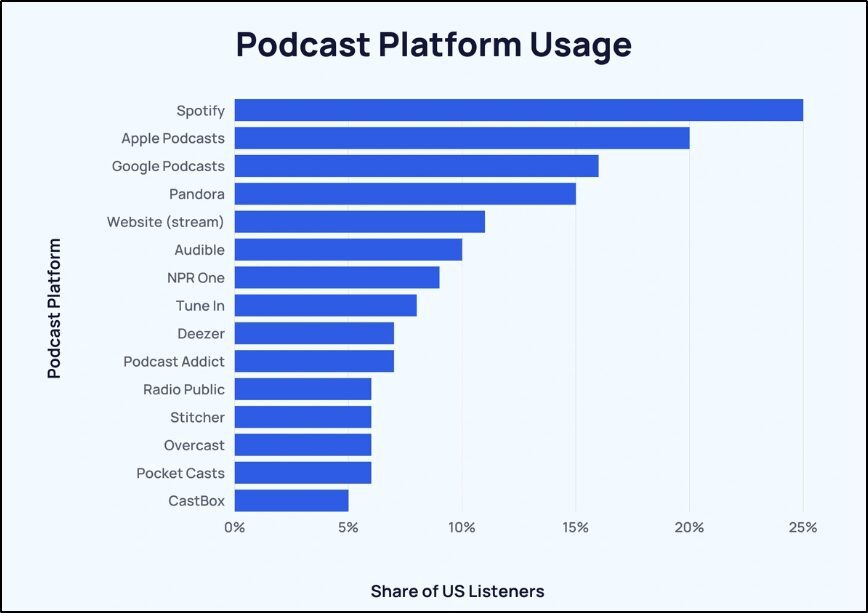

But since every one of these platforms has thousands of podcasts, you must also optimize your podcast listing to show up in platform searches and attract listeners.
Here are a few ways to do that.
- Create a catchy and brandable podcast name that reflects your main topic and sounds exciting. For example, instead of “SEO Tips For Beginners,” something like “Rankable,” “Authority Hacker,” or “SEO Chronicles” is much more memorable and brandable.
- Use a descriptive podcast title for every episode, including the main topic using relevant search keywords.
- Write a detailed podcast description highlighting its key discussion points and helping the users decide if it’s the right show for them.
- Use a custom podcast thumbnail (if supported by the platform).
Optimizing your podcast for SEO not only helps it rank on podcast platforms but also gets it indexed and listed by Google Search, resulting in thousands of organic search visitors.
Podcast Marketing Tip #4: Promote In Relevant Online Groups
Relevant online communities, groups, and discussion forums are great places to promote your podcast.
You can search Facebook Groups, LinkedIn Groups, Quora, Reddit, and other industry-specific discussion forums for relevant discussion threads to share your podcast.
However, if you start spamming these platforms with your podcast links, you’ll get banned pretty quickly. So, the right way to do this is to become a part of the discussion, add value with your advice, and only share your podcast link as a reference or an additional resource people can check out to learn more about the topic.
Also, use your profile on these platforms to promote your podcast by briefly describing it and adding its link in your bio.
Podcast Marketing Tip #5: Convert Your Podcast Into A YouTube Video
YouTube is the world’s second-largest search engine, where the demand for podcasts has skyrocketed over the last few years.
This is why many podcasters now also record a video version of their content to use as a YouTube podcast.
Doing so helps them grow their YouTube subscribers and drive traffic to their podcast websites and platforms, such as Apple Podcasts and Spotify.
But even if you don’t record a video version of your podcast, you can turn it into a video file with graphics or a title slide. Buffer, a leading social media marketing app, uses this approach to repurpose its podcasts for YouTube.
You can create YouTube podcasts in two different ways.
- Record a video podcast and upload it as a regular YouTube video.
- Upload your video file using the “create podcast” option in YouTube Studio (only available in the US).
YouTube also recently launched YouTube Podcasts in the US, listing the platform’s best podcast shows in various categories.
Podcast Marketing Tip #6: Repurpose For Short Video Platforms
Once you convert an audio podcast into a video file, there are many ways to repurpose it and drive hundreds of thousands of visitors to your podcast site.
For example, you can create short video clips (1-2 minutes long) of the best moments of your podcast and share them on YouTube Shorts, Facebook Reels, TikTok, Twitter, and other social media platforms.
These short video platforms (TikTok and YouTube Shorts in particular) drive insane engagement and can help you skyrocket your podcast’s growth.
Here’s an example of a popular YouTube podcast that repurposes content for TikTok and gets millions of additional views because of TikTok’s incredible demand.


However, all of these platforms demand consistency. If you regularly publish content for a few months, these platforms will start recommending your content to relevant viewers, resulting in exponential traffic growth to your podcast website.
Podcast Marketing Tip #7: Transcribe Your Podcasts
Transcribing your podcast is another easy way to drive traffic to your website and gain thousands of listeners through organic SEO.
Why? Because despite all its advancements, Google still can’t index audio content or the keywords used in it. So, even if your podcast has the most groundbreaking information on a topic, Google Search has no way to understand it.
But transcribing your podcast and turning it into a well-structured text format instantly makes it indexable for Google and enables it to show your podcast to relevant searchers.
Niche Pursuits, a popular podcast in the online business industry, uses this approach to attract search traffic.
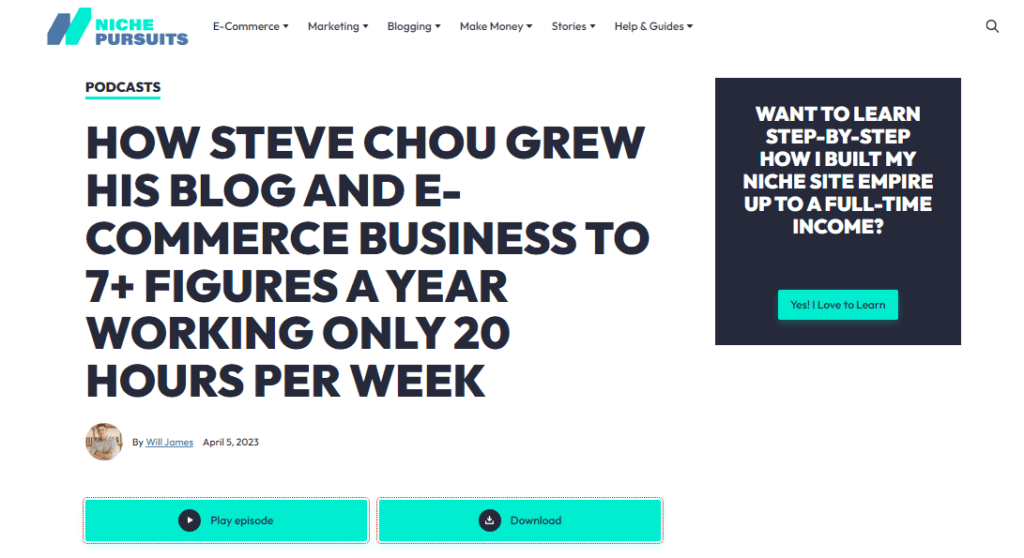

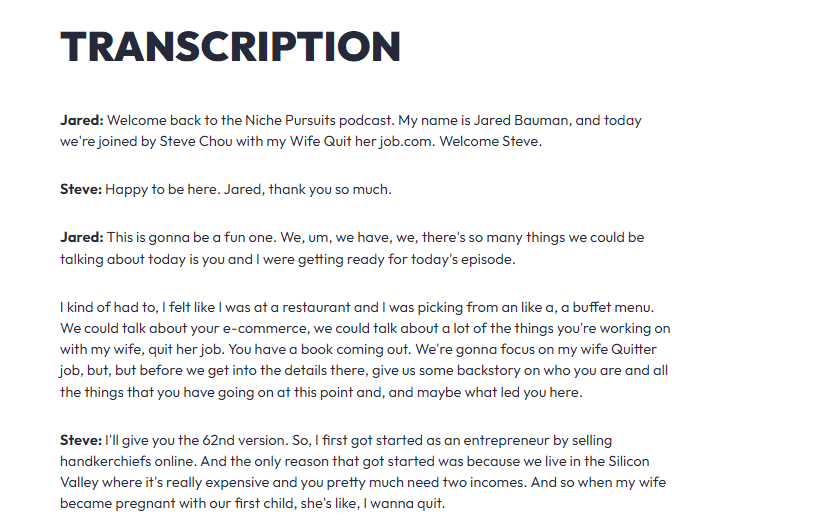

Apart from SEO, transcribing your podcasts helps your audience skim through your podcast content and find the information they want faster.
In addition, it also allows them to copy/paste sections of your podcast and reference them on other platforms.
Podcast Marketing Tip #8: Repurpose Into A Blog Post Series
Once you transcribe your podcast, it opens up more ways to promote and repurpose your content. One of them is turning your transcription into a series of blog posts.
Since podcasts often cover multiple topics in detail, you can easily break down the ideas discussed in a podcast into five, six, or even more articles.
This would help you in two ways.
- It’ll drive organic search traffic to your podcast website.
- It’ll help people discover your podcast through your blog content.
These articles would be much more valuable than a generic piece of content because they’ll contain quotes from your podcast that none of your competing content would have.
Podcast Marketing Tip #9: Reference Older Episodes
As you publish new podcast episodes, your older content can get buried in the archives and might not get the attention it deserves.
So, make sure you regularly reference your older content in your new episodes, mention your past guests, and encourage your listeners to check out your previous podcast episodes.
To make it easier, you can share the links to the episodes you mention in your podcast’s description.
Here’s an example of a detailed podcast description containing relevant links for the audience.
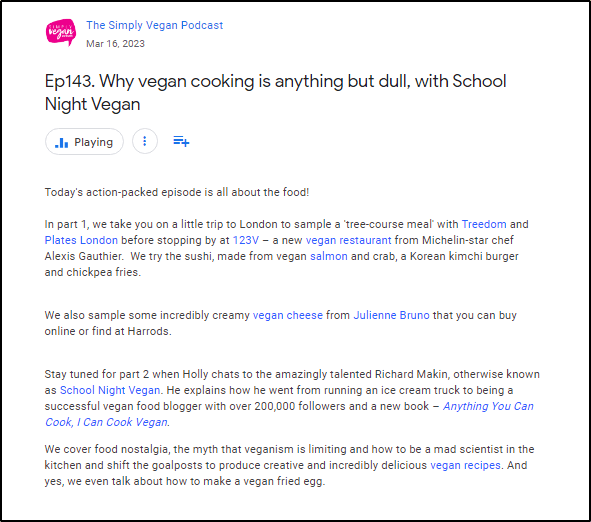

If you look closely, this description links to older episodes and outside sources mentioned during the episode. You can also use it for promoting any specific affiliate or useful resources on your website.
Podcast Marketing Tip #10: Tell Your Email Subscribers
An email list is your greatest asset as an online content creator. So, if you don’t have one yet, you must start building an email list today and move your listeners from third-party platforms to a list you own.
When you have an active email list, generating the early momentum for your podcast episodes is just an email announcement away. You don’t need to wait for users on Apple Podcasts, Google Podcasts, or any other platform to discover you organically.
Because you can use your email list to drive traffic to your podcasts whenever you want.
Just like Ray Edwards.
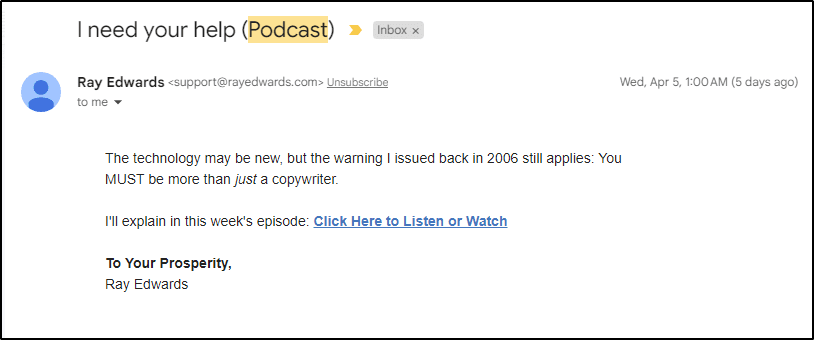

He, and many other podcasters, email their subscribers whenever they publish a new podcast. Plus, they regularly email their archive content as well, whenever it makes sense.
Podcast Marketing Tip #11: Pull Quotes For Social Media
Podcasts are lengthy, in-depth discussions with valuable insights. But to attract listeners, you must give them a glimpse of what’s inside an episode.
Pulling quotes from your podcasts and sharing them as social media images is an excellent way to do that. In fact, as the current co-host of the long-running Leading Learning Podcast, Learning Revolution founder Jeff Cobb, uses this exact strategy to promote its (over 350) episodes.
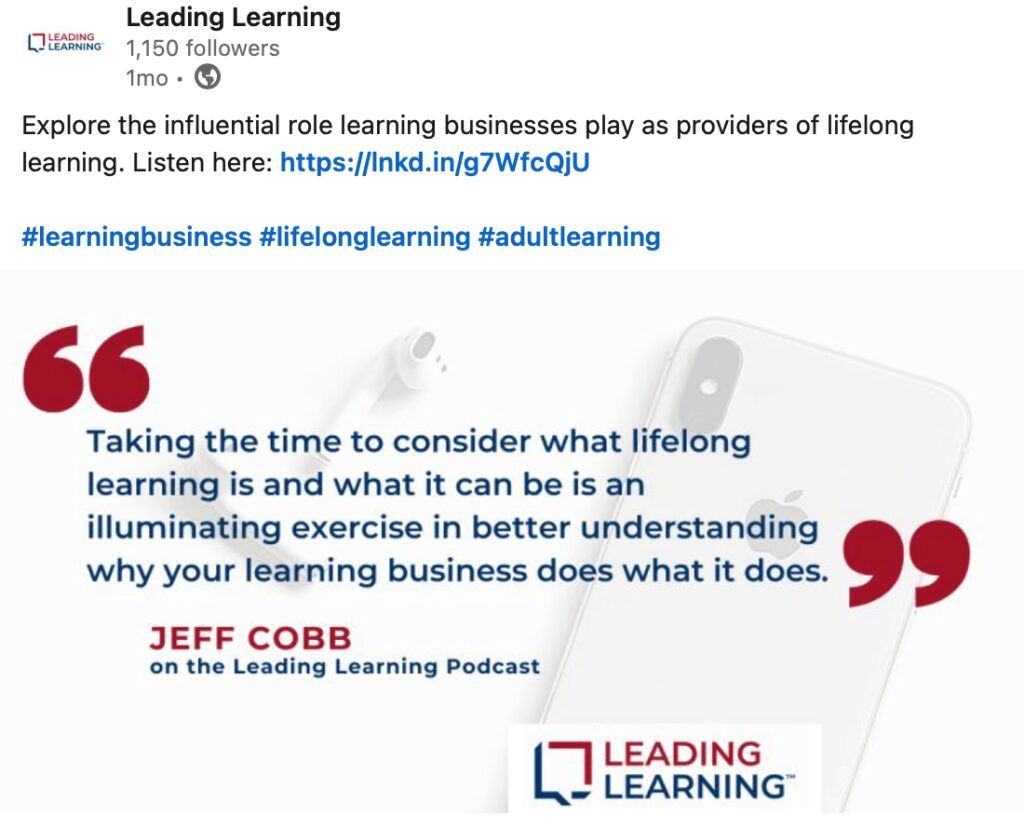

These images are great for driving traffic and building your brand authority.
You can share them on Facebook, Instagram, Twitter, LinkedIn, and almost any social network your audience uses.
Podcast Marketing Tip #12: Leverage Guest Podcasting
You’ve probably heard of guest blogging, a marketing technique where you offer free blog content to established websites to get exposure and backlinks.
Apply the same strategy to podcasting for immediate results.
How? Let me explain.
- Identify other emerging podcasters in your industry who’re slightly ahead of you in audience size and influence.
- Analyze their content and see if they’ve missed any topic you can cover.
- Pitch yourself as a podcast guest by highlighting the value you can offer their audience.
To succeed with this strategy, you must have something valuable to share, such as a case study, a success story, the results of an experiment, a unique experience, or a research finding.
Not everyone would welcome you to their show, but even one or two good appearances can get the ball rolling for you. Then gradually move towards more popular podcasts with bigger audiences to gain more exposure.
Podcast Marketing Tip #13: Get Mentioned In Leading Blogs
Blogs and online publications always seek expert quotes to make their content more credible and share worthy.
You can make their job easier and get backlinks to your podcast website by sending them quotes from your podcast interviews.
For example, here’s a writer looking for first-hand insights to include in an article for Shopify.
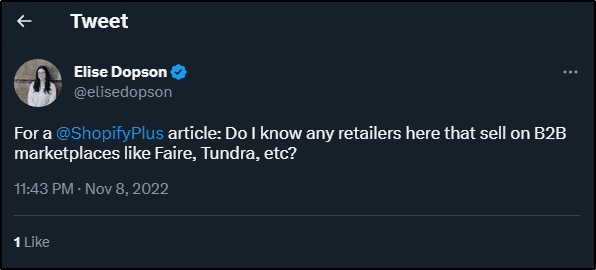

You’ll find such requests from writers in almost every niche.
And even if you don’t, you can use platforms like HARO and Help A B2B Writer, where hundreds of brands, journalists, and publications look for credible first-hand experiences to include in their content.
You can pull out quotes from your podcasts and share them in response to any relevant requests to get your show featured in a top publication.
Podcast Marketing Tip #14: Ask Your Guests To Spread The Word
Podcast guests are influencers with a large following on social media and other online platforms.
When they agree to appear on your show, request them to spread the word about it in their circles. This would create anticipation for your podcast and help you gain new listeners.
For example, they could tag you on Twitter, saying something like, “Watch out for my podcast with @yourname early next week.”
Once your show goes live, send them a quick email requesting them to share the show’s link with their email subscribers and social media followers.
Tim Ferris regularly links to his podcast interviews in his emails.


You can do that with your archive content as well.
For example, you could ask an old guest to Tweet their episode link again. This keeps your content alive longer and helps you drive a higher ROI on every episode.
Podcast Marketing Tip #15: Encourage Listeners To Share And Review
Podcast platforms have thousands of active shows in every category.
How do they decide which podcasts appear at the top of the search results for specific topics? Apart from the podcast’s title and description, most platforms use the number of positive reviews and the frequency of shares on a podcast as critical ranking factors.
So, you must regularly ask your listeners to leave positive comments and reviews on your podcast so it rises in the platform’s listings.
You can do that at the show’s start and before concluding an episode. In addition, you can also drop reminders during the episode or in your podcast description.
Podcast Marketing Tip #16: Create Podcast Teasers
Release short teasers at least a week before a new episode to create anticipation in your listeners and spread the word about your show.
Ideally, you should do it on all the platforms where you publish or repurpose your podcasts. For example, you could create a 30-60 clip containing the best moments from your upcoming podcast and share it on Twitter, YouTube, Facebook, LinkedIn, and any other relevant platforms with a link to the main show.
Make it more engaging by adding captions, background sound effects, and clearly mentioning the date & time it goes on-air.
In addition, send a quick email to your subscribers announcing the upcoming show with a Google Calendar link so that they get timely reminders.
Podcast Marketing Tip #17: Cover Trending Topics
Your channel needs to target a niche and a specific audience with a well-defined set of problems or needs. So, you can’t cover every trending topic on the internet.
However, you can research the hottest trends in your industry or the current problems/needs of your audience to create more engaging content.
Here are a few quick ways to find trending topics.
Competitor Analysis: Keep an eye on what your most popular competitors are talking about.
Google Trends: Go to Google Trends, check the trending topics in your target region, and shortlist the ones relevant to your audience. For example, I checked the last 30-day search trend in the finance niche and selected the US as my target region.
Here are the trending topics and search terms according to Google Trends for my criteria.
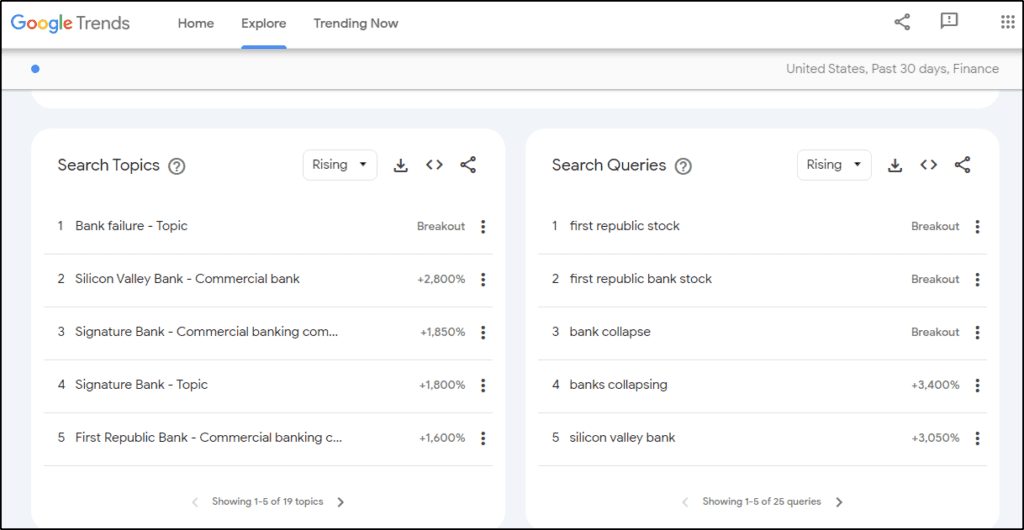

Social Media Hashtags: Check the trending hashtags and topics on Twitter, Facebook, TikTok, and other social networks to quickly grasp the hottest topics in your target region.
Podcast Marketing Tip #18: Invest In Advertising
Finally, if you’re serious about growing your podcast audience, use paid advertising campaigns to create early momentum for your show.
Spotify, Google Podcasts, and most other podcast platforms allow you to advertise your products, services, or content to your target audiences for a fixed advertising fee.
But outside these platforms, you can use Facebook and YouTube ads to drive listeners to a landing page on your podcast website and turn them into email subscribers. This way, your paid traffic would become your permanent business asset and reduce your reliance on advertising with time.
What Podcast Marketing Strategies Do You Follow?
Podcast demand is growing at an exponential rate. So, you’re still not late to the party. However, with the rising competition, you must devise a marketing strategy before launching your podcast so that you can start promoting it from day 1.
The most critical part of any podcast marketing strategy is your podcast website because everything else revolves around it, as you’ve seen in this article.
But what other podcast marketing strategies have you tried or seen work for your competitors? We’d love to hear about them in the comments.
Table of Contents



